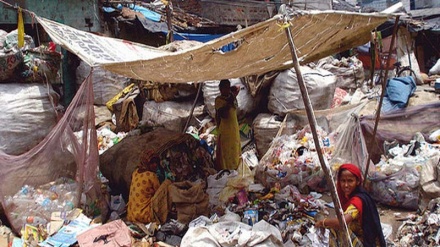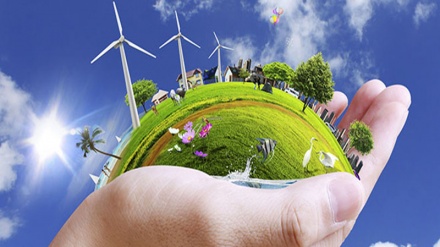We only have one planet to live on (3)
Welcome to the 3rd weekly episode of the series We Only Have One Planet to Live On. Today, we speak of the importance of water.
Water is one of the important elements which shape the global environment. If one looks at Earth from space, he will view it as a blue-colored planet, filled with water. The total volume of water on the surface of the planet stands at roughly 1360 million cubic kilometers, covering nearly 71% of our planet’s surface. Approximately, 97.5% of these waters are saline seas and lakes, while only 2.5% of them are fresh waters. Out of this volume of fresh water, 0.3% is in the form of rivers; 30.8% are underground water currents; and 68.9% are glaciers and the permanent blankets of snow on mountains. Hence, given the restricted water sources, water can be named as a vital element, and the most important material needed by living creatures, after air. Water plays a fateful role in the health, well-being and lives of human beings and rise or fall of population. It also highly contributes to economic, social, and political development of countries. UN Chief, Ban Ki-Moon, in a visit to Tajikistan’s Capital, Dushanbe, in the early days of June 2015, pointed out the importance of water in the life of mankind. He noted that water is essential for the life and health of mankind. Access to water is man’s right. There is nothing more important than water for man’s existence.
The fact is that water is one of the essential sources for continuation of life on our planet. According to UN, each human being needs 20 to 50 liters of water per day to drink, cook, and clean. But, currently, more than a billion people have no access to a permanent source of pure water. Roughly, 5000 children under the age of 5 die every day due to consumption of contaminated water and bad hygienic conditions. In addition to contamination of water, global warnings indicate that 46 world countries, with a population of more than 2.7 billion people, are currently facing water shortages; the root cause of which is climatic changes. The shortage of water in some parts of the world has reached such a critical phase that finding a drop of drinking water has turned into a daily priority for the residents of these regions. According to experts, the climatic changes are set to fuel the shortage of water and to surge the demand of industrial and agricultural sectors of countries for water.
According to UN chief, within the next decade, nearly 1.8 billion people in the world will face limited sources of water, while two thirds of this population will grapple with intense shortage of water.
Shortage of water can lead to a fall in production of food and energy in different regions of the world and cause major challenges for governments. According to an article, recently penned in Water Politics Publication, shortage of water will impact global economic growth in the future, and will cause many political challenges and instabilities. Upon climatic changes, shortage of water and its related impacts will mount every year. Up until the year 2025, more than half of the world’s population will grapple with shortage of water, and by the year 2050, over 75% of the world’s population will suffer from the scarcity of water. It is perfectly clear that in the future, access to water will be key to global economic growth and policies of governments.
Moreover, an article in Foreign Policy Publication has referred to shortage of water as the future crisis of nations, which will cause confrontations among countries.
This article points out that a string of problems have led to confrontations among countries. However, the main problem which will mount tensions among governments in the foreseeable future is shortage of water which may even fan the flames of war among nations.
This article further mentions the shortage of water in East Africa, noting that drought in Somalia has led to a deadly confrontation among Somali tribes for access to water.
Based on recent studies, signs of tensions and disputes among countries in regard to access to water have surfaced. For instance, two years ago, a dispute emerged between Egypt and Ethiopia over River Nile, which even pushed the two countries to the brink of a military confrontation.
The officials of Jordan, which is currently facing shortage of water, have warned over the possibility of break out of a deadly battle over water in the future.
Reports show that Zionist regime consumes water three times more than Palestinians, and therefore the terms of consumption of water sources have always been one of the lingering disputes between Palestine self-rule Authority and the usurper Israeli regime. Dispute over water sources between Turkey, Syria, and Iraq is another case of such discrepancies. Some experts in hydro politics believe one of the reasons behind Turkey’s support for opponents of Syrian ruling system is the disputes which have emerged between Turkey and Syria over Tigris and Euphrates Rivers. Syria has also made use of political leverages on a number of occasions to pile up pressure on Turkey in regard to access to water.
Moreover, India and Pakistan have disputes over Indus River. China, Nepal, India, and China are in disputes over the possession of rivers, which originate from Himalaya Mountains, each trying to gain a higher share of these rivers, which in turn provide water needed by 500 million people.
In Central Asia, there are tensions between Uzbekistan, Kyrgyzstan, Kazakhstan, and Tajikistan over Amu Darya and Syr Darya Rivers, and a number of rivers which originate from Aral Sea.
In South America, the countries of Argentina and Uruguay have referred to Hague International Tribunal over their dispute on River Plate. Meanwhile, the US and Mexican officials believe they maintain a higher share of the water sources of Rio Grande and Colorado Rivers. In North Africa, a joint river between Botswana, Mozambique, Zambia, and Zimbabwe has been a source of friction between these four countries. There have also been disputes between Mauritania and Senegal on controlling the joint water sources between these two countries.
President Hassan Rohani, in an address to Climate Change Summit in New York, in the year 2014, noted that whatever scarce source that mankind needs can lead to confrontation and/or war, and this is an irrefutable fact.
Hence, the future world will put high emphasis on water. This in turn has led to a rise in tendency of companies to invest in this domain. For instance, England, which faces shortage of water, is studying a project for construction of a water pipeline for transferring Scotland’s water to England. Turkey is also set to sell water to Central Europe, Cyprus, Egypt, and Malta, within the framework of a similar project. Hence, it can be said that throughout global exchanges, the countries which maintain sufficient water sources are in more appropriate conditions compared to other countries. Also, countries which would be able to make use of water as a commodity will be able to reap huge profits from this source in the coming decade. Meanwhile, this trend has led to the reactions of human rights activists, who believe that no money should be paid for water. Many of the governments also point out that access to water is a right of mankind.
MR/ME


